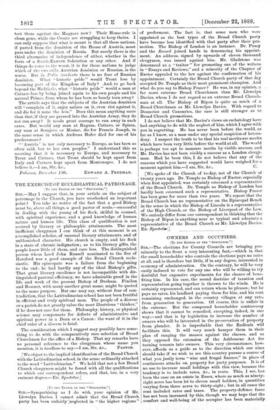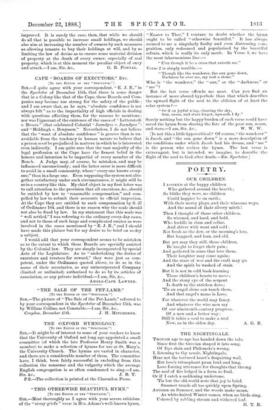OWNERS AND OCCUPIERS.
[To THE EDITOR OF THE "SPECTATOR.')
SIR,—The elections for County Councils are bringing pro- minently to the front a very interesting fact,—which is, that the small householder who controls the elections pays no rates at all, and is therefore but little, if in any degree, interested in economy of administration. On the contrary, he will be very easily induced to vote for any one who will be willing to try doubtful but expensive experiments for the chance of bene- fiting him. In his case, the sound doctrine of taxation and representation going together is thrown to the winds. He is certainly represented, and can return whom he pleases ; but he pays no rates, his landlord paying them for him, and his rent remaining unchanged, in the country villages at any rate, from generation to generation. Of course, this is unfair in the extreme. But the compound householder controversy shows that it cannot be remedied, excepting, indeed, in one way,—and that is by legislation to increase the number of owners who will be interested in the preservation of property from plunder. It is improbable that the Radicals will facilitate this. It will very much hamper them in their plan of ranging the masses against the classes, and so they opposed the extension of the Ashbourne Act for turning tenants into owners. This very circumstance, how- ever, affords us a guide as to the direction which our aims should take if we wish to see this country pursue a course of what you justly term "wise and frugal finance," in place of continuous attacks on property for party purposes. It is of no use to increase small holdings with this view, because the tendency is to include rates, &c., in rents. This, I see, has been the case on an estate in Essex, where as much as ninety- eight acres has been let to eleven small holders, in quantities varying from three acres to thirty-eight ; but in all cases the rent included rates and taxes. The property-defence force has not been increased by this, though we may hope that the comfort and well-being of the occupier has been materially improved. It is surely the case, then, that while we should do all that is possible to increase small holdings, we should also aim at increasing the number of owners by such measures as allowing tenants to buy their holdings at will, and by so limiting the law of devise as to ensure some material division of property at the death of every owner, especially of real property, which is at this moment the peculiar object of envy











































 Previous page
Previous page